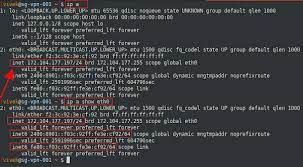Securing Your Online Experience with Ubuntu VPN
Exploring the Benefits of Using a VPN on Ubuntu
Ubuntu, one of the most popular Linux distributions, offers a range of features that make it a versatile and secure operating system. When it comes to enhancing your online security and privacy, using a Virtual Private Network (VPN) on Ubuntu can provide numerous benefits.
Enhanced Security
By using a VPN on Ubuntu, you can encrypt your internet connection and protect your data from potential threats. This added layer of security is especially important when using public Wi-Fi networks or accessing sensitive information online.
Bypassing Geographical Restrictions
A VPN can help you bypass geographical restrictions by masking your IP address and making it appear as though you are accessing the internet from a different location. This can be useful for accessing region-locked content or services that may not be available in your country.
Privacy Protection
With a VPN on Ubuntu, your online activities are shielded from prying eyes, including your Internet Service Provider (ISP) and potential hackers. Your browsing history, downloads, and communications remain private and secure.
Anonymity Online
Using a VPN allows you to browse the internet anonymously, without revealing your true identity or location. This can be particularly beneficial for those who value their privacy and want to maintain anonymity while surfing the web.
How to Set Up a VPN on Ubuntu
Setting up a VPN on Ubuntu is straightforward and can usually be done through the network settings menu. Many VPN providers offer dedicated applications for Linux users that make the setup process even easier. Simply enter your VPN credentials, choose a server location, and connect to start enjoying enhanced security and privacy online.
In Conclusion
Using a VPN on Ubuntu is an effective way to safeguard your online activities, protect your data, and enjoy greater freedom when browsing the web. Whether you’re concerned about security risks or wish to access restricted content, incorporating a VPN into your Ubuntu setup can offer peace of mind and added functionality.
Seven Key Benefits of Using a VPN with Ubuntu: Elevating Your Digital Security and Privacy
- Enhanced online security
- Protection of sensitive data
- Bypass geographical restrictions
- Privacy and anonymity online
- Secure browsing on public Wi-Fi networks
- Access to region-locked content
- Peace of mind while surfing the web
Seven Drawbacks of Using VPNs on Ubuntu: Compatibility, Speed, and Other Considerations
- Limited VPN client support for certain VPN providers on Ubuntu.
- Potential decrease in internet speed due to encryption and routing through VPN servers.
- Some free VPN services may have data limitations or slower connection speeds on Ubuntu.
- Complex setup process for manual configuration of certain VPN protocols on Ubuntu.
- VPN connection issues may arise, requiring troubleshooting and technical knowledge to resolve on Ubuntu.
- Not all applications or services may work optimally when used with a VPN on Ubuntu.
- Cost associated with premium VPN services that offer advanced features and better performance on Ubuntu.
Enhanced online security
Utilising a VPN on Ubuntu provides a significant boost to online security by encrypting your internet connection and shielding your data from potential threats. This heightened level of security is particularly valuable when connecting to public Wi-Fi networks or handling sensitive information online, ensuring that your digital activities remain protected and private.
Protection of sensitive data
Using a VPN on Ubuntu provides a crucial benefit in the form of protecting sensitive data. By encrypting your internet connection, a VPN ensures that your personal information, browsing history, and communications are shielded from potential cyber threats and prying eyes. This added layer of security is essential for safeguarding confidential data and maintaining privacy online, making Ubuntu VPN an invaluable tool for users who prioritise the protection of their sensitive information.
Bypass geographical restrictions
One notable advantage of using a VPN on Ubuntu is the ability to bypass geographical restrictions. By masking your IP address and routing your internet connection through servers in different locations, a VPN enables you to access online content and services that may be restricted or unavailable in your region. Whether you want to stream geo-blocked content, access websites not available in your country, or use services limited to specific regions, a VPN on Ubuntu empowers you to overcome these barriers and enjoy a more open and unrestricted online experience.
Privacy and anonymity online
By utilising a VPN on Ubuntu, users can benefit from heightened privacy and anonymity while navigating the digital realm. With the encryption of internet traffic and masking of IP addresses, individuals can shield their online activities from prying eyes, ensuring that their browsing history and personal information remain confidential. This added layer of protection not only safeguards sensitive data from potential threats but also allows users to browse the web with a sense of anonymity, preserving their online identity and location discreetly.
Secure browsing on public Wi-Fi networks
Utilising a VPN on Ubuntu provides a crucial advantage of secure browsing on public Wi-Fi networks. By encrypting your internet connection, a VPN shields your data from potential threats and malicious actors when accessing the internet on public Wi-Fi hotspots. This added layer of security ensures that your sensitive information remains protected, giving you peace of mind while browsing, banking, or conducting any online activities in public places. With Ubuntu VPN, users can confidently connect to public Wi-Fi networks without compromising their privacy or security.
Access to region-locked content
By utilising a VPN on Ubuntu, users can enjoy the benefit of accessing region-locked content that may otherwise be restricted in their location. By masking their IP address and connecting to servers in different regions, Ubuntu VPN users can bypass geographical restrictions and unlock a world of content, including streaming services, websites, and online platforms that may not be available in their current location. This feature enhances the user experience by providing access to a wider range of content, ultimately enriching their online activities and entertainment options.
Peace of mind while surfing the web
By utilising a VPN on Ubuntu, users can experience a sense of peace of mind while surfing the web. The added layer of security and privacy provided by the VPN ensures that online activities are shielded from potential threats and prying eyes, allowing users to browse with confidence and without concerns about their data being compromised. This peace of mind enables users to enjoy a safer and more secure online experience, knowing that their information is protected and their privacy is maintained.
Limited VPN client support for certain VPN providers on Ubuntu.
One notable drawback of using a VPN on Ubuntu is the limited support for certain VPN providers, which can restrict users’ choices when selecting a service that aligns with their preferences. Some VPN providers may not offer dedicated clients or comprehensive support for Ubuntu, leading to potential compatibility issues and limitations in terms of features and functionality. This limitation may require users to seek alternative solutions or workarounds to effectively utilise their chosen VPN service on the Ubuntu platform, potentially complicating the setup process and diminishing the overall user experience.
Potential decrease in internet speed due to encryption and routing through VPN servers.
One potential drawback of using a VPN on Ubuntu is the possibility of experiencing a decrease in internet speed. This slowdown can occur as a result of the encryption process and the rerouting of your internet traffic through VPN servers. The additional layers of security and privacy provided by the VPN may lead to slightly slower connection speeds, especially when connecting to servers located far away from your physical location. It’s important to weigh the trade-off between enhanced security and potential speed reduction when considering using a VPN on Ubuntu for your online activities.
Some free VPN services may have data limitations or slower connection speeds on Ubuntu.
When considering using a VPN on Ubuntu, it’s important to be aware of potential drawbacks, such as encountering data limitations or slower connection speeds when opting for free VPN services. Some free VPN providers may impose restrictions on the amount of data you can transfer or offer slower connection speeds compared to premium services. These limitations can impact the overall user experience and may hinder your ability to browse the internet efficiently. Therefore, it’s advisable to carefully evaluate the features and performance of free VPN options before deciding on a service for your Ubuntu system.
Complex setup process for manual configuration of certain VPN protocols on Ubuntu.
Configuring certain VPN protocols manually on Ubuntu can be a challenging task due to the complex setup process involved. Users may encounter difficulties in setting up these protocols, requiring a deeper understanding of networking concepts and technical expertise. The manual configuration of specific VPN protocols on Ubuntu can be time-consuming and may pose a barrier for less experienced users who are looking to enhance their online security and privacy.
VPN connection issues may arise, requiring troubleshooting and technical knowledge to resolve on Ubuntu.
When using a VPN on Ubuntu, one potential drawback is the occurrence of VPN connection issues that may arise, necessitating troubleshooting and technical expertise to resolve. These issues could range from connectivity problems to configuration errors, requiring users to delve into the technical aspects of VPN setup on the Ubuntu operating system. Addressing these challenges may demand a certain level of technical knowledge and troubleshooting skills, which could be a barrier for less experienced users seeking to utilise a VPN on their Ubuntu system.
Not all applications or services may work optimally when used with a VPN on Ubuntu.
When utilising a VPN on Ubuntu, one potential drawback to consider is that not all applications or services may function optimally. Some applications may experience performance issues or connectivity problems when routed through a VPN connection on Ubuntu. This can be due to compatibility issues or restrictions imposed by the VPN service itself, which may impact the user experience for certain tasks or services. It is important to be aware of this limitation and assess whether the benefits of using a VPN outweigh any potential disruptions to specific applications or services on the Ubuntu operating system.
Cost associated with premium VPN services that offer advanced features and better performance on Ubuntu.
One notable drawback of using a VPN on Ubuntu is the cost associated with premium VPN services that provide advanced features and improved performance. While there are free VPN options available, they often come with limitations in terms of speed, server locations, and security protocols. Opting for a paid VPN service can offer a more reliable and efficient connection, but this convenience comes at a price. Users may need to consider their budget when choosing a premium VPN service for Ubuntu to ensure they are getting the desired level of performance without overspending.




